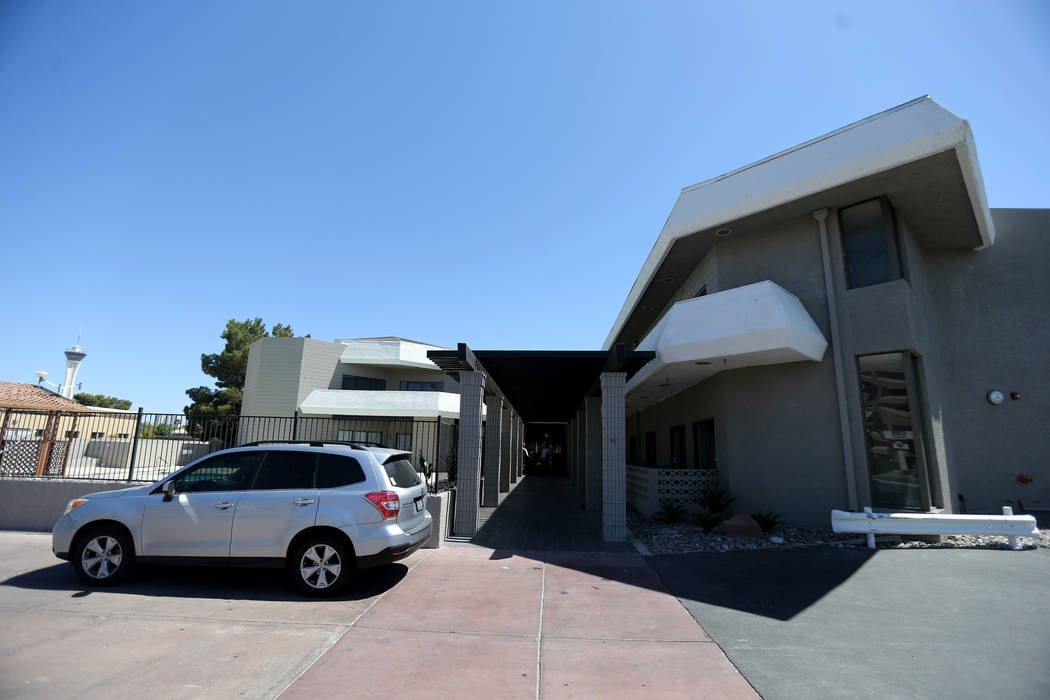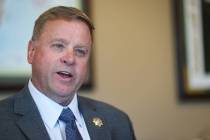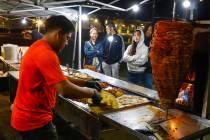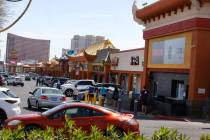Clark County partnership tries new approach to tackle homelessness
Clark County has taken a step toward its goal of providing “housing first” to fight homelessness with approval of a contract to provide shelter for up to 25 patients undergoing substance abuse treatment.
The County Commission last week approved a four-year, $7.2 million contract with Charleston Residential Service LLC, to provide housing for patients who receive treatment at Crossroads of Southern Nevada’s rehab center at 2121 W. Charleston Blvd.
The public-private partnership is “different than anything we have actually seen in Clark County,” because it covers uninsured patients and delivers a holistic care model where multiple issues can be addressed simultaneously, said commission Chairwoman Marilyn Kirkpatrick.
But the approach mirrors a national trend in treatment.
Insurance companies typically will only reimburse service providers for stays of between two and five days for crisis stabilization for a covered patient, Crossroads CEO Kevin Morss said. But it takes an average of 90 days to stabilize clients and increase the likelihood that they will not return to the streets, he said.
To help narrow that gap, Crossroads has entered into contracts with Medicaid providers Health Plan of Nevada and Anthem. The county’s money will fill in the gaps for the uninsured or whatever costs insurance won’t reimburse.
Through the new contract, Crossroads will get up to $1.4 million each year to cover its services.
Assistant County Manager Kevin Schiller told the Review Journal that the partners will bring their particular strengths to the program.
“It’s really critical if we want to create a service array related to a triage of clients and increase capacity, we can’t do that in silo,” he said. “The ability to benefit from each other is really significant.”
“Meaning individuals coming off the streets seeking substance abuse and mental health treatment will have a place to come, get stabilized and not be returned directly to the street,” added Tim Burch, administrator of human services for the county.
The public funds for the contract came from the $9.8 million in marijuana business license fees set aside for homeless services this fiscal year.
The contract approved last week is the first of three such contracts to be awarded. Contracts with the other two providers — Bridge Counseling Associates, Inc. and Southern Nevada CHIPs — will be voted on at a future County Commission meeting.
The beds are sorely needed in Southern Nevada, a region with the fewest affordable housing units available in the nation. Meanwhile, this year’s homeless census counted 5,530 homeless people in Clark County in January.
Of those, 622 were categorized as chronically homeless, meaning they have been on the streets for at least a year. More than half of those were identified as having mental illness or substance abuse issues.
Morss said that about 80 percent of the patients who arrive at Crossroads are uninsured or unable to pay for their portion of the cost of the 90-day program.
Morss said the model for Crossroads is still evolving, but the facility uses a holistic approach to address substance abuse, mental health, medical and socialization issues. The clinic has seen 3,600 people from January until last week, and 33 percent have come back more than once, he said.
The facility also offers a workforce program aimed at getting clients ready to hold steady jobs. Of the 250 clients who have completed the program since its inception, 70 percent have landed jobs through partnerships with local businesses.
Though he voted for funding the new program. Commissioner Lawrence Weekly expressed concern about what might happen if demand for the service exceeds the supply of beds.
“What I don’t want to see happen down the line, if the money gets funny and the change gets a little strange, we start seeing stories of people after one or two days being dumped out on the streets,” he said. “We don’t want that to happen, to where we’re in crisis mode, because we’re already in crisis mode.”
One Crossroad patient, Winston Yuzon, testified before the commission that the services the center provides can make a huge difference in getting someone off the streets.
He said he was homeless in December 2018 when he had at heart attack and was diagnosed with cardiomyopathy. He later learned that his heart functions at 25 percent of capacity.
“I prayed to God to ask him for three things: for death to come swift and painless, not to die on the streets and not to die alone,” he said.
He’s now one year sober.
“There are bits and pieces of a puzzle: You’re part of it. I’m part of it, and Mr. Kevin puts it together and what comes out is a tapestry of second chance of life, hope and life, with dignity,” Yuzon said.
Contact Briana Erickson at berickson@reviewjournal.com or 702-387-5244. Follow @ByBrianaE on Twitter.























